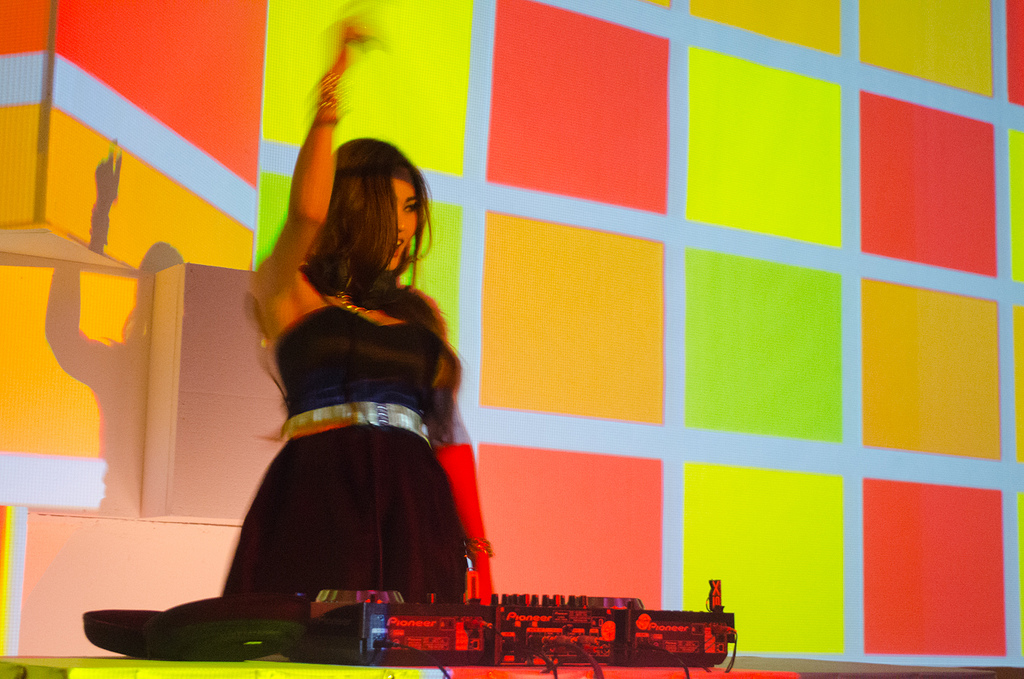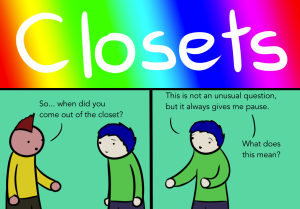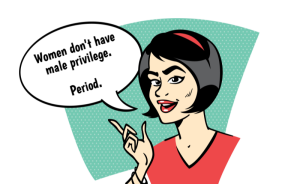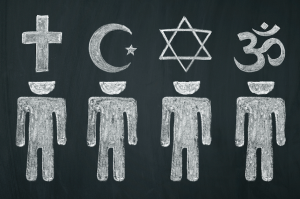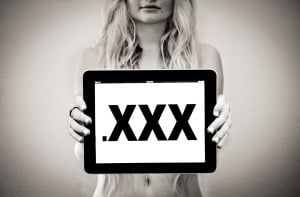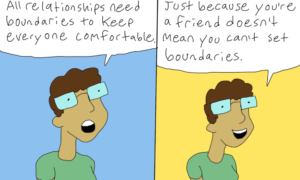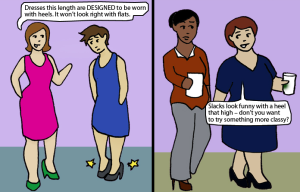When New York-based deejay Jada Haitoff, a biracial woman of afroeuropean decent, confronted the sound technician about broken equipment during a gig, he told her, “If you ever talk to me like that again, I’ll slap the shit out of you.”
She knew the situation would have played out differently had she not been a woman. After all, this incident was just another example of how women in her industry experience sexism every day.
Haitoff, who goes by the stage name JADALAREIGN, was caught by surprise and panic after her equipment—which totaled over $1,200—was being used by another DJ and her expensive headphones were snapped in half.
“I was obviously upset,” said Haitoff, of her discussion with the sound technician. “I would like to expect to be treated with respect but I know … over my career, I’ve come to realize things don’t operate how they should.”
Over her career as a DJ, Haitoff has been distinctly reminded that she is a woman, and not always in a positive light. “It still seems like there’s a stigma when a woman enters a male dominated space,” she said. And Haitoff isn’t alone in feeling that way.
She is one of many women DJ’s who face blatant discrimination in the DJ industry.
Despite the large numbers of badass women and LGBTQ DJs tearing up the decks, DJing is a straight-cis-male dominated industry. These men are often the gatekeepers, club owners, and managers and bookers, monopolizing line-ups at festivals, clubs and parties.
Women and LGBTQ persons often experience sexism and discrimination in the DJing, nightlife and club culture. They are less likely to be booked and frequently placed on line-ups as tokens for their communities.
Though we’ve seen a push in the industry to diversify DJ lineups in the last few years, historically women and marginalized communities have a harder time making headway in the field. But for every rude remark or tokenist job-offer, these DJs are pushing back with all their strength in ways little and big.
There are many more, I’m sure, but here are 5 ways that women DJs experience sexism in DJing, nightlife and club culture, based on my conversation with New York deejays:
1. Being Treated As Less Competent
Women that are DJ’s, no matter their level of experience, are often treated like rookies. This happens to women in many workplaces. In 2017, 42 percent of women reported experiencing discrimination in their workplace, according to Pew Research Center. 23 percent said they felt they were treated as less competent.
From professional cheerleaders to coders, women’s intelligence is devalued in the workplace—deejays are no different. Sri Lankan born Thanushka Yakupitiyage, or Brooklyn’s DJ Ushka, is a queer woman who has presence to spare and a visible confidence in her abilities, has regularly been questioned.
Though she had nearly a decade work of experience, she is often subject to mansplaining—when men attempt to explain a subject to a woman, typically condescendingly and usually something the woman already knows.
“When I would show up to a gig sound tech[nicians], who are also often men, would be like ‘Who are you?,’” she said. “They’d be like ‘Oh, do you know what you’re doing?’”
In male dominated industries like DJing, women are more likely to experience discrimination versus more diverse workplaces. They’re 37% more likely to have been treated as though they were incompetent, according to Pew Research Center.
“In the beginning, I was a little naive because I was just grateful to have space I could DJ,” DJ Ushka said. Over the years, she has grown to recognize the worth of her talent and those other women who are DJ’s in her network.
2. Being Tokenized
Women deejays are often subject to tokenism. They are made the only women in their line-up and used to help appeal to women listeners.
“Sometimes people will give you an opportunity because you’re a woman and they think it’s a good look,” said Haitoff.
An increased push for more diverse DJ line-ups has driven bookers to search a little bit harder for a more inclusive set of DJs. Women and LGBTQ led DJ collectives work toward highlighting and booking their DJs to diversify line ups.
But quick and unthoughtful diversification can lead to tokenism, or one women and/or queer DJ in a line-up of straight men.
Tokenism sucks because it casts a stigma on those non-male DJ’s, with questions like “Are they there because they’re good or to fill a quota?” As of 2017, only 6.5% of festival acts—a huge job source for DJs—were mixed gender.
“I was constantly the only women on line-ups,” said Ushka. “I just DJ’d this Friday and I was the only women on the line-up.”
This tokenism can make gigs stressful. “People are ready to shit on you,” said Haitoff, who says being the only women on a line up can feel like you’re representing your entire community. “Sometimes things feel really high stakes because of the way people talk about women who are DJ’s is very different then when they talk about men.”
One bad set can mean you don’t get booked again, or worse the venue shies away from booking women altogether—stigmatizing all of the women deejays that seek work thereafter because of one off night.
“But at the same time no one starts as an expert at anything,” said Haitoff, on not putting too much pressure on herself. Like most skills, with practice over time, you get better—so good in fact that, one off night can no longer make or break you.
“You come to a point when you’re undeniable.”
3. Experiencing Microaggressions
Microaggressions can happen at any job, especially when the workplace is lacking in diversity.
They are “the everyday verbal, nonverbal, and environmental slights, snubs, or insults, whether intentional or unintentional, which communicate hostile, derogatory, or negative messages to target persons based solely upon their marginalized group membership,” according to Psychology Today.
For women in DJing this can play out in several ways. “They talk to you like a child almost,” said DJ Adair, a Black lesbian DJ working in NYC, of working with patronizing club staff. They underestimate her level of skill, she said, looking to male sound technicians as authority figures until they hear her spin. “And then you’re killing it, and they’re like “Oh shit, that was really good.”
Adair realized early on in her DJ career that working in white, straight and cis space was not for her. It’s what inspired herself and four friends to start Haute Sauce, a queer woman of color party hosted once a month and DJ’d mostly by WOC queer deejay’s.
“I’m not interested in catering to someone’s space not built for me,” Adair said on starting a party geared toward queer people of color. “I challenged myself and it’s allowed me to control more of the narrative around what I’m doing and creating”
DJ Ushka does the same with her party iBomba, a party focusing on “global bass, digital cumbia, and future dancehall.”
4. Undergoing Blatant Disrespect and Violence
Haitoff’s experience is a perfect example of how what starts as microaggressions can quickly become violent.
The sound tech that threatened her was not reprimanded to her knowledge, even after she spoke with the club manager and other staff. Haitoff responded the only way she could think of.
She sent a letter to DJs in her network asking them not to work with that club and explaining what she had experienced.
The letter outlined her experience and “noted the importance of creating safe spaces and demanding safe conditions for women DJs,” she said. She also asked that others not work at the space “in order to create a precedent and bring about safer conditions for our community.”
5. Not Getting Paid Equally
Not unlike several other industries, non-male DJs have trouble getting paid what they’re truly worth. Nearly 40% of female creative entrepreneurs are earning less than $9 per hour, according to a survey Honeybook, a creative team-management agency.
All this in spite of the fact that most creative entrepreneurs—73% of men and women—hold degrees. In 15 states, over 35% of female creatives make less than minimum wage.
For DJs, this means that women make only $0.46 for every $1.00 made by a man.
“This is my career…I just feel I deserve more respect than that,” said Haitoff, who says she has been asked to perform for unfair amounts. One time a bookee even tried to pay her for just one of the five hours she worked.
This type of short-changing means that Haitoff, and others, have to work double or triple the hours to pay their rent and bills if they want to DJ full-time. Both Yakupitiyage and Adair have full-time day jobs to help make ends meet.
Yakupitiyage uses her network and community to help her overcome the mental strain of it all. “Over the last five years I have intentionally created so much community,” she said, on turning to those in her industry that she is close to for support.
“I choose to create connections with newer DJs and folks who have been doing this for a while.” This aspect of self-care, she said, has helped her to both support others and feel supported herself.
Sharing their story and speaking with peers and elders in DJing has helped Haitoff, Adair and Ushka to learn and share wisdom—like never underselling themselves, doing their research and fighting for what they’re worth.
***
The discrimination and sexism that DJs experience is horrible for all those involved, including us. Here’s what you can do about it:
If you’re a deejay: Do your homework. Do your research. Be confident, firm, know what you deserve.
For all of us party-goers and music lovers, remember that your deejay is an artist like anyone else. Connections and communities are made on the dancefloor. We should not undermine or underestimate the power of that.
DJs take care of us and we need to take care of them. “Tell [clubs] the DJ’s you like,” said Ushka. “Keep pushing like “Yo, I wanna hear this DJ place.” And if you see a DJ being treated unfairly, say something and tell your friends.
When you go to a club or party, you expect to feel safe to dance and enjoy yourself. You hope that the DJ will help facilitate that by playing great music. But we forget that the DJ wants to feel safe too—safe to share their gifts with you, safe to play in peace. They expect fair pay and respect, just like anyone else.
If we do our part, then everyone can leave having had a great night.
[do_widget id=’text-101′]
Maya Lewis is a 20-something Brooklynite, by way of Maryland. She spends her time writing about things she believes are interesting and finding ways to trick people into reading them.
Search our 3000+ articles!
Read our articles about:
Our online racial justice training
Used by hundreds of universities, non-profits, and businesses.
Click to learn more
Most Read Articles
- « Previous
- 1
- …
- 30
- 31
- 32


